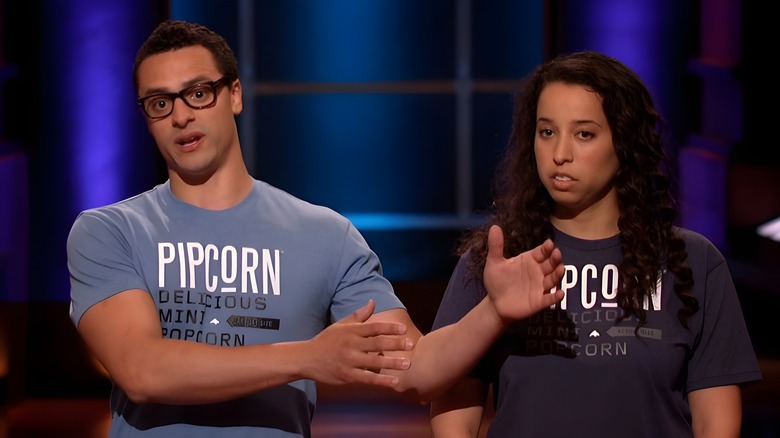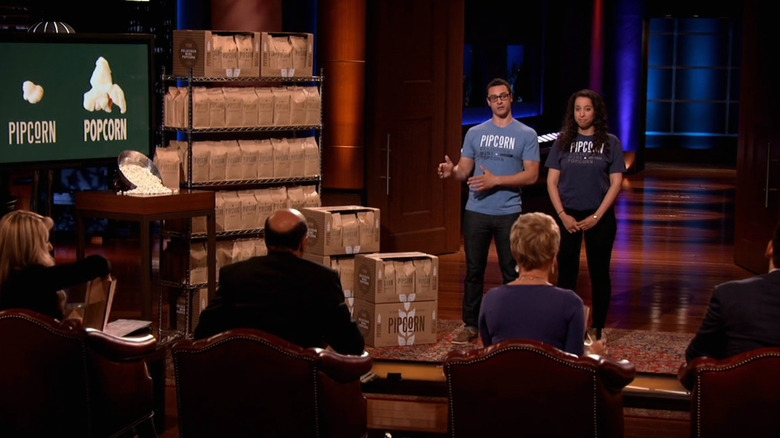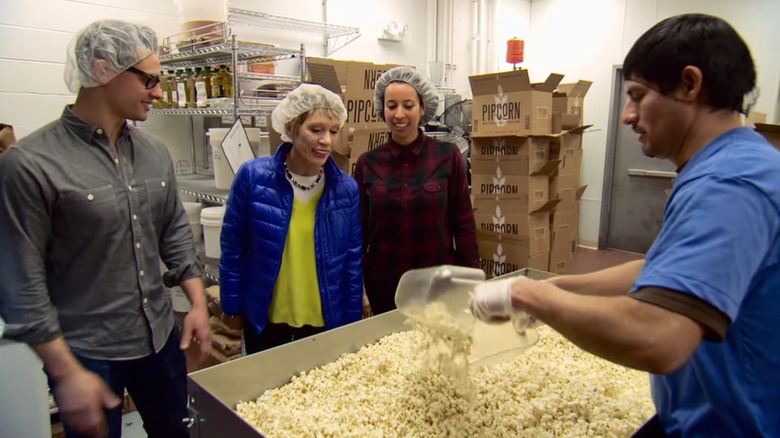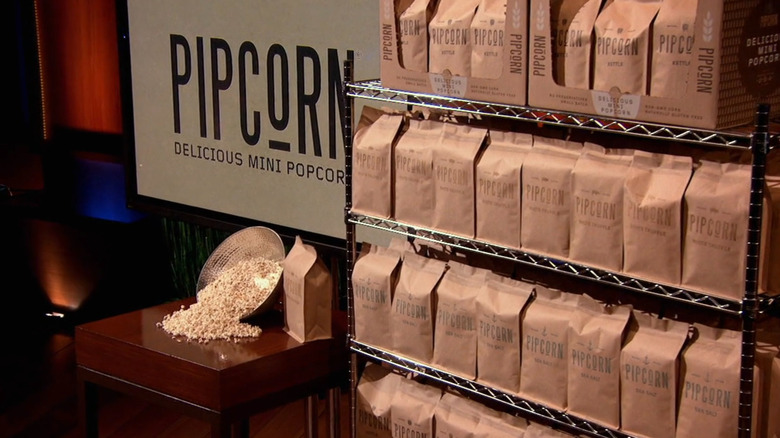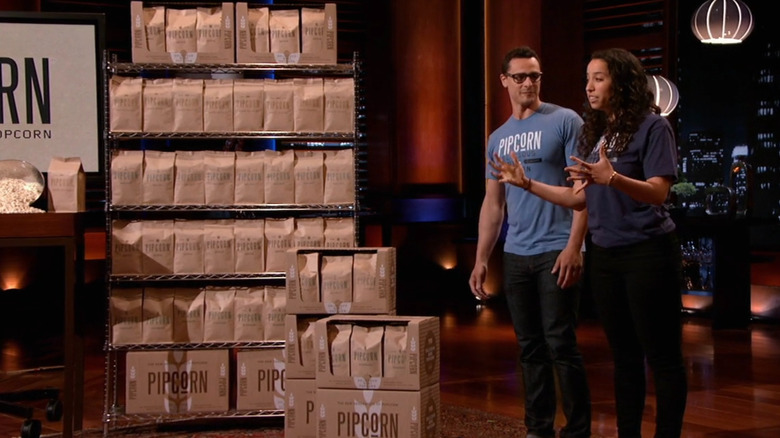Whatever Happened To Pipcorn After Shark Tank?
Pipcorn is looking to take its pint-sized popcorn alternative to the big leagues. The business creates a line of heirloom popcorn made from specially produced kernels that come in at about half the size of regular popcorn. This means those annoying chunky kernels and hulls that get stuck in your teeth are a thing of the past. Pipcorn is also vegan, gluten-free, and cooked using olive oil instead of butter.
The company was launched in 2012 by siblings Jennifer and Jeff Martin. The year before, they had heirloom popcorn while looking for something to snack on in Jennifer's new apartment. Jennifer, who has issues digesting normal popcorn (as revealed on "Shark Tank"), discovered this variety while working at a health food store. With the help of Jeff's wife Teresa, they started Pipcorn. The same year as their launch, Pipcorn saw major traction after being featured on Oprah's Favorite Things list. "She only picks amazing products, so to even be considered is just the biggest compliment we can ever ask for," Jennifer said during a surprise visit from Oprah.
The opportunity not only got them some new customers but managed to catch the attention of the "Shark Tank" producers, who reached out to the duo for a chance to be featured. During the initial audition process, the team realized they weren't ready for "Shark Tank" yet. A year later, they returned for another chance and made it on to the show. Did their hard work pay off?
What happened to Pipcorn on Shark Tank?
"Shark Tank" Season 6 sees Jeff and Jennifer Martin seek an investment of $200,000 for 10% of their snack company, Pipcorn. The two explain in their introductory segment that while they believe in the value of their product, they lack the distribution and manufacturing resources needed to scale their business to the next level.
Kevin O'Leary wants to know if he can get the kernels popped himself. Jeff explains he could, but their rapid growth is close to getting them an exclusive deal for popping with their farmer. In the past year, they sold $200,000 from 40 stores, 18 of which are Whole Foods locations. Their margins raise some concerns, with the Pipcorn going for $4.99 and costing $1.80 to produce. However, the team aims to cut costs once their co-packer allows them to outsource the majority of production. O'Leary is doubtful of their $2 million valuation, even though they are confident in their acceleration as a company, with plans to earn $440,000 by year's end from 65 stores.
Nevertheless, Mr. Wonderful is not convinced and goes out. Robert Herjavec offers the $200,000 at a 20% equity stake. The brother-sister team refuse, only willing to go for the deal they came in with. While agreeing with Herjavec that the valuation is too high, Barbara Corcoran likes the team enough to offer them the $200,000 at 10%, although she also requests to draw 10% whenever Jeff and Jennifer take out money. Herjavec drops his equity to 10% with no contingencies. In the end, the siblings go for Corcoran, whose expertise in the food business is unmatched on the tank.
Pipcorn after Shark Tank
The Pipcorn "Shark Tank" episode aired on November 14, 2014. The "Shark Tank" effect was in full force that evening, as their website was flooded with new orders throughout the night. Within 24 hours, Pipcorn received 7,000 new orders.
The company got an update segment on Season 6, only months after its initial appearance on the show. They reveal that they've had 12,000 orders since airing on "Shark Tank" but had difficulties fulfilling the demand. However, the team handled the situation with level-headed honesty, keeping their customers filled in on the delay and even giving 50% off follow-up orders with free shipping for those who waited especially long. They also partnered with new co-packers in the Midwest, West, and Eastern regions. In the three months since closing the deal with Barbara Corcoran, Pipcorn made $1.1 million.
Pipcorn returned for a second update segment on the first episode of "Shark Tank" Season 7. The section centered on both Pipcorn and Corcoran's Scratch and Grain Baking Company during their time at the 2015 Summer Fancy Food Show, where Pipcorn won an award for outstanding sweet snack. At this point, Pipcorn earned $1.4 million and was in 75 different stores. Pipcorn was featured on a Season 2 episode of "Beyond the Tank," where Corcoran helps the team land a new distributor in New Jersey.
2018 would see Pipcorn encounter a major dilemma when a deal with a South African group for a $3 million investment failed to materialize. Over a difficult summer season when the company was largely supported by family and friends, the team developed new heirloom-based snacks, such as cheese puffs. By early 2019, Pipcorn received a $6 million investment from Factory LLC.
Is Pipcorn still in business?
Pipcorn has continued to see great growth in recent years. While its specialty popcorn remains the company's claim to fame, Pipcorn has moved beyond its flagship product to include other snack items such as cheese balls and twists, each coming in a variety of flavors. You can find Pipcorn products online through its website and Amazon, as well as countless retailers, including Whole Foods, Target, Walmart, and Ralphs.
Barbara Corcoran remains a strong supporter of Pipcorn. Along with advertising their products and bringing the team to her All-Star entrepreneurs retreat, Corcoran considers Pipcorn her favorite deal made on "Shark Tank." The longtime shark revealed this in a 2014 interview with Business Insider, where she praised the skills of co-founders Jennifer and Jeff Martin, saying, "They're terrific. They're both in their own right phenomenal entrepreneurs. And they're together! Do you know how exciting it is to get two for the price of one? Usually, you have a winning entrepreneur and a sidekick who's a quanter [numbers person] ... and that's tricky business. I've had to do that. When you have two rock-solid entrepreneurs, each with talents that are also complementary to one another, that's the trifecta, three for two."
She's not the only one who admires them. Pipcorn has had some big-time coverage over the years, including features in Forbes, Women's Health, Inc., New York Post, Female Startup Club, and many more. Currently, Pipcorn brings in an estimated $5 million a year in revenue and is worth $10 million.
What's next for Pipcorn?
Pipcorn's selection of fun, healthy treats has been a hit with countless consumers. But even if its products have been enjoyed by celebrities such as Oprah Winfrey, Kim Kardashian, and Jessica Alba, the team behind the booming snack company ultimately hopes to use its brand to celebrate and empower the achievements of everyday, like-minded individuals from varying communities.
In the past, Pipcorn has launched such initiatives as their Mini Moments campaign in 2016, a YouTube series that saw people reveal little moments in their day-to-day lives that bring them joy. Since then, the team has been seeking new ways to use their success to uplift historically marginalized entrepreneurs. In a 2021 interview with Well + Good, co-founders Jennifer and Jeff Martin discussed these plans, with Jeff explaining, "We're doing what we can to extend our network to other BIPOC (Black, Indigenous, and people of color) CEOs and founders to pull our resources. They may be our direct competitors on the shelves, but behind the scenes, we're banding together. It's not about competition; it's about making a long-term positive impact."
The company has already taken some steps in the right direction with a monthly blog that spotlights Black-owned food brands. Building a community through this shared passion is an admirable effort and is sure to pay off in more ways than one for Pipcorn and the industry as a whole.
